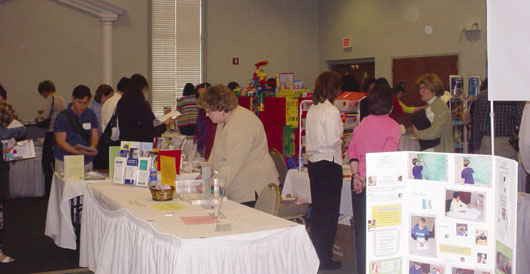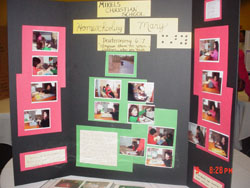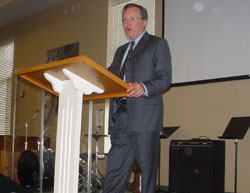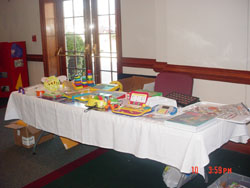
Homeschooling conferences can be found just about everywhere. They run from small city-wide events to large state or regional conferences. Others are dedicated to specific curricula or educational philosophies. No matter the size, theme or founding organization, many homeschoolers consider conferences to be a very important part of living a homeschool life. There are opportunities to learn through speakers and workshops, to sit and talk with other homeschoolers, to play, to browse curricula.
But what are your choices if what you most want to talk about... to learn about... to see curricula and items for... is an area that seems to be left out of many conferences - special needs education?
A large number of parents begin homeschooling precisely because their child has a special need - maybe one that is affecting more than just their ability to learn.
With this concern in mind, the organization GIFTSNC, Inc. began planning for their first annual Special Needs Homeschooling Conference. The conference was held at Colonial Baptist Church in Cary, NC on March 9-10, 2006.
GIFTSNC, which stands for "Giving and Getting Information For Teaching Special Needs Children," was begun in May 2001. Founder and President Kim Ashby began GIFTSNC as an email support group after trying some groups that turned out to not be quite what she had expected.
Kim had not been able to find a local support group for special needs homeschoolers in the Raleigh area when she first started homeschooling. She joined a couple of e-groups hoping to find people who were homeschooling a child with significant physical disabilities. As she told me, "All of these were national groups, all were very small, and most had children with learning disabilities only. I only found one, very small group that was supportive and met my needs. That group dissolved in the fall of 2000. I decided it was time to start a group for homeschoolers with special needs children and decided that it would be a group specific to NC. My hope was that we could really focus on sharing local resources if we all lived in NC." Although Kim also hoped face-to-face groups would spring up in different counties, so far that has not come to pass.
Once GIFTNSC began, it was just a matter of time until the idea of their own conference came up. Kim explained, "For several years, I noticed our group always discussed the North Carolina Home Educators (NCHE) conference and how disappointed we were that there were not more workshops addressing our special needs issues. Last June 2005, as we started talking again about the lack of special needs workshops at the state conferences, the idea was tossed out that it would be wonderful to have a GIFTSNC conference sometime in the future. I realized then that unless you were in our shoes, you really didn't understand how best to support us. How could we continue to expect groups like NCHE to know what type of workshops would meet our needs?" As Kim pointed out, "Very few speakers on the homeschool conference circuit can really address special needs." She came to the conclusion that many in the GIFTSNC group deserved to be considered as experts.
 Realizing that homeschooling a child with significant challenges is really a fairly recent change within the homeschooling movement, Kim also realized that such parents had an urgent need for immediate help. "We needed a conference now!" By the end of June, her group had brainstormed a long list of potential topics. In July, she asked for volunteers to work on a GIFTSNC Board.
Realizing that homeschooling a child with significant challenges is really a fairly recent change within the homeschooling movement, Kim also realized that such parents had an urgent need for immediate help. "We needed a conference now!" By the end of June, her group had brainstormed a long list of potential topics. In July, she asked for volunteers to work on a GIFTSNC Board.
From this, the conference began to take shape. GIFTSNC became incorporated by August 2005 and began planning for this event. "It is amazing to see all we were able to do in a few short months," Kim enthused. "Most people spend all year (or longer) planning a conference! We were not able to get many of the vendors we hoped for because they were already committed to other conferences. We also learned a couple months ago that we were competing with a conference on dyslexia and a conference on visually impaired/blind children. It was so apparent that God was in control the whole time!"
What GIFTSNC pulled together in this short time was a conference attended by 245 paid attendees from not only North Carolina but South Carolina, Florida, Mississippi, Florida, Tennessee, Maryland, Pennsylvania, and Ohio. In addition, some vendors and speakers attended workshops and the keynote address but were not included in the official count. Attendees had learned of the conference by word-of-mouth sharing between homeschooling families, the North Carolina Home Educators and Home Educators Association of Virginia newsletters, and HSLDA's NC newsletter.
The conference opened on Thursday night with the exhibitor's hall and workshops. Exhibitors included Mayer-Johnson (a company specializing in augmentative communication products), Generations/Tadpole AT Lending Library, ATC Educational Services, the Autism Society of North Carolina Bookstore, Biometrics International, The Center for Visual Learning & Rehabilitative Therapy, The Creative Teacher, Discovery Toys, Live & Learn, Foundations Bible Study, Independent Learners, Inc., Math-U-See, National Association for Child Development, Specialized and Structured Teaching/Workbox System, Stone's Educational Super Store, Understanding the Way/Sail Away, and Usborne Books at Home.
Joy Thomas, who presented the session "Life In A Blender" said, "I enjoyed looking through a vendor area full of materials, books and manipulatives applicable to my children's educational needs!"
 The workshops on Thursday evening included sessions covering beginning homeschooling, resources, "Delaying the Teaching of Reading - When is it Harmful?" "Understanding Processing Disorders to Develop Potential," "Auditory Processing Disorders," teaching tips, single-parent homeschooling, and nutritional supplements.
The workshops on Thursday evening included sessions covering beginning homeschooling, resources, "Delaying the Teaching of Reading - When is it Harmful?" "Understanding Processing Disorders to Develop Potential," "Auditory Processing Disorders," teaching tips, single-parent homeschooling, and nutritional supplements.
After the Thursday evening workshops, conference attendees attended a mixer where they were able to relax and connect with other parents while viewing posters that some attendees brought to share how they and their children spend their days. Posters included describing a day homeschooling a blind child and a child with Down's Syndrome. Many posters were from parents of children who have Autism, ADHD, and Asperger's Syndrome. Various items from vendors were given as raffle gifts, as well as for the best poster contest.
The keynote address opened the conference on Friday morning, and was delivered by Dr. Mel Levine. Dr. Levine is the Professor of Pediatrics and the Director of the University of North Carolina's Medical School in Chapel Hill. Dr. Levine also co-founded a non-profit Institute, All Kinds Of Minds, for the study of learning differences with financier Charles R. Schwab. In addition, Dr. Levine has also published numerous books, among them All Kinds of Minds, A Mind at a Time, and The Myth of Laziness and is the star of a WGBH-Boston video series, Developing Minds.
 Dr. Levine opened his session with a commendation for parents who are choosing to educate their child at home, saying, "Parents are in the best position to understand their children." Early in his speech, Dr. Levine expressed a dislike for labeling. "Instead of labeling the child, we [should] label the problem." He cautioned parents to "beware of labels, they are so in remiss, they (become) all-consuming and don't acknowledge strengths." Later in the session, Dr. Levine also stated that "The ADD/ADHD label is a huge mistake and continues to be. Attention cannot be separated from other aspects. The real issue isn't attention, but the other difficulties and the child's strengths."
Dr. Levine opened his session with a commendation for parents who are choosing to educate their child at home, saying, "Parents are in the best position to understand their children." Early in his speech, Dr. Levine expressed a dislike for labeling. "Instead of labeling the child, we [should] label the problem." He cautioned parents to "beware of labels, they are so in remiss, they (become) all-consuming and don't acknowledge strengths." Later in the session, Dr. Levine also stated that "The ADD/ADHD label is a huge mistake and continues to be. Attention cannot be separated from other aspects. The real issue isn't attention, but the other difficulties and the child's strengths."
Dr. Levine pointed out. "Traits in childhood that are considered to be deficient may be the basis for their future success." He also demonstrated a wry sense of humor, noting that, "There is 100 percent neurologic dysfunction in this world."
Among his advice for parents, Dr. Levine discussed helping children to know themselves "Don't be afraid to ask your child. It's awesome how often the kids can tell where their different problems are." Dr. Levine also stated "No child should be asked to remember something they won't need to know six weeks later. It's better to know how to find out the names of the rivers in Africa, than to waste time. Working on the skill is better than [focusing on] the content." In addition, "Take the weakness out of the equation. Write the report, get thoughts on paper, then go back another day to focus on the editing."
Dr. Levine also stressed that parents need to consider neurodevelopmental issues in education. For an example, Dr. Levine discussed what is needed to solve word problems. "There is sentence recall, the math problem itself, factual recall, pattern recognition and memory transfer, visualization while reading and an ability to focus on details... Children need to learn how to learn, not what to learn." He further commented, "Some children should be taught to read with auto mechanics magazines. The memory problems disappear as you work with a child's affinity."
Dr. Levine also discussed how he feels that "Public humiliation works against children. [They develop] a pessimism about the future. Everything we do with kids needs to be heavy on the optimism for the future." Dr. Levine closed his session with the call once again to focus on a child's strengths and interests, and his optimism for children's future success as not being dependent upon grades or SAT scores.
After Dr. Levine's talk, conference participants had the opportunity to ask general questions, as Dr. Levine stressed that he was not able to answer specific questions about a specific child. Teresa McKenzie of Leesburg, VA, said, "I really enjoyed his speech and how he mentioned there are many challenges children can have that don't show up on tests."
Kim Ashby noted, "Dr. Levine was kind enough to donate his time and expertise as the keynote speaker for our first GIFTSNC conference. He was an energetic speaker. His talk was informative, fun to hear and peppered with a large number of helpful examples. His understanding of how a child's brain works and how a child learns is impressive, but more importantly, he is able to explain what is often very technical information in a manner that is easily understood by a lay person. What he had to say about how a child learns and the best learning environment for a child was very affirming for homeschool parents who are often told by 'experts' that we are not capable of teaching our special children." Her sentiments were echoed by the comments on the feedback forms given to participants that included "Awesome, hope he can return!" "I would like to have had another session with Dr. Levine," and "Would love to hear from him again."
Friday afternoon workshops included sessions discussing sensory integration disorder, LEGO Robotics, fine motor skills approaches, motor planning disorders, inquiry-based science and children with language delays, NC-based community resources, reading and spelling (more than one session), and inclusion in homeschooling activities.
Throughout the conference, parents made many social connections. While waiting for a session to begin, Christie Pickel and her daughter Erin (age 5) connected with Joyce Wolf. Erin, a delightful child with a broad smile, has no formal diagnosis. "Her condition is some form of leukodystrophy, which affects the myelin levels in her brain," explained Christie, "She is my miracle girl!" Joyce's son is similarly affected. With no diagnosis, it would have been unlikely for the pair to have met, yet through the GIFTSNC conference, they were able to share the joys of their children, discuss treatment options and resources, and simply connect as mothers of children with a rare special need.
After the conference, Christie enthused, "The conference was wonderful and I came home with lots of great ideas from everyone, especially other parents! I feel confident in my decision to homeschool Erin."
Attendee Sue Shrager agreed: "I wish it would go on for another two days. This has been awesome! There have been so many experts and resources to tap into. This was so professionally done, and with a low budget thanks to hard work and kindness! I'd like to thank GIFTSNC for putting this conference together."
From heart-warming personal connections; to information regarding various medical conditions; to educational techniques, methods and ideas; the GIFTSNC Conference helped to meet the needs of a growing community of homeschooling parents. Comments from the end of conference survey indicate that the conference was very successful, and that the attendees intend to return next year as well as assist to make future conferences as enjoyable and informative as this inaugural conference.
Where to Find It